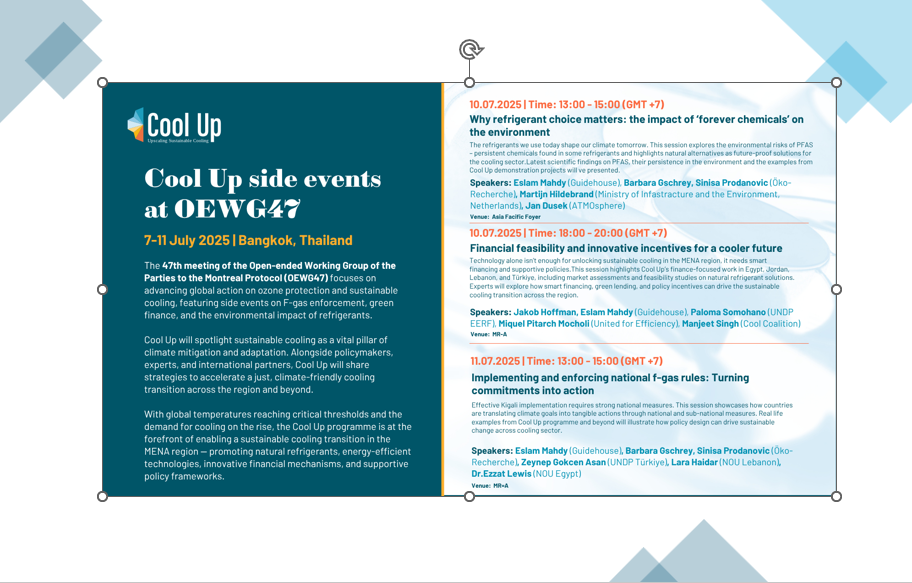By 2040, energy demand in the Middle East and North Africa (MENA) is projected to increase by 50%. Cooling generally represents more than half of the energy consumption in air conditioning-equipped households in this region. Many of the typical space cooling and refrigeration system appliances are inefficient and rely on refrigerants with a high global warming potential. Climate change, rapidly growing populations, urbanization, and higher standards of living will spur this increasing demand for cooling and thus exacerbate the adverse effects that increased cooling demand has on the ozone layer.
By 2040, energy demand in the Middle East and North Africa (MENA) is projected to increase by 50%. Cooling generally represents more than half of the energy consumption in air conditioning-equipped households in this region. Many of the typical space cooling and refrigeration system appliances are inefficient and rely on refrigerants with a high global warming potential. Climate change, rapidly growing populations, urbanization, and higher standards of living will spur this increasing demand for cooling and thus exacerbate the adverse effects that increased cooling demand has on the ozone layer.
Header
By 2040, energy demand in the Middle East and North Africa (MENA) is projected to increase by 50%. Cooling generally represents more than half of the energy consumption in air conditioning-equipped households in this region. Many of the typical space cooling and refrigeration system appliances are inefficient and rely on refrigerants with a high global warming potential. Climate change, rapidly growing populations, urbanization, and higher standards of living will spur this increasing demand for cooling and thus exacerbate the adverse effects that increased cooling demand has on the ozone layer.
- This is a list
- Bullet list
Heading 1
Heading 2
Heading 3
Heading 4
Heading 5
Heading 6




Component: CTA Site Wide
By 2040, energy demand in the Middle East and North Africa (MENA) is projected to increase by 50%. Cooling generally represents more than half of the energy consumption in air conditioning-equipped households in this region. Many of the typical space cooling and refrigeration system appliances are inefficient and rely on refrigerants with a high global warming potential. Climate change, rapidly growing populations, urbanization, and higher standards of living will spur this increasing demand for cooling and thus exacerbate the adverse effects that increased cooling demand has on the ozone layer. The German Federal Ministry for the Environment, Nature Conservation and Nuclear Safety (BMU) seeks to address these and other topics related to climate change mitigation in its International Climate Initiative (IKI).
Component: Counter
Training hours
Component: CTA Text block
By 2040, energy demand in the Middle East and North Africa (MENA) is projected to increase by 50%. Cooling generally represents more than half of the energy consumption in air conditioning-equipped households in this region. Many of the typical space cooling and refrigeration system appliances are inefficient and rely on refrigerants with a high global warming potential. Climate change, rapidly growing populations, urbanization, and higher standards of living will spur this increasing demand for cooling and thus exacerbate the adverse effects that increased cooling demand has on the ozone layer. The German Federal Ministry for the Environment, Nature Conservation and Nuclear Safety (BMU) seeks to address these and other topics related to climate change mitigation in its International Climate Initiative (IKI).
Component: Text
By 2040, energy demand in the Middle East and North Africa (MENA) is projected to increase by 50%. Cooling generally represents more than half of the energy consumption in air conditioning-equipped households in this region. Many of the typical space cooling and refrigeration system appliances are inefficient and rely on refrigerants with a high global warming potential. Climate change, rapidly growing populations, urbanization, and higher standards of living will spur this increasing demand for cooling and thus exacerbate the adverse effects that increased cooling demand has on the ozone layer. The German Federal Ministry for the Environment, Nature Conservation and Nuclear Safety (BMU) seeks to address these and other topics related to climate change mitigation in its International Climate Initiative (IKI).

Policy and regulation are powerful stimuli to encourage the uptake of new technologies. In Cool Up we support our partner countries in leveraging policy stimuli and developing policy interventions that accelerate implementation of the Kigali Amendment.
Policy and regulation are powerful stimuli to encourage the uptake of new technologies. In Cool Up we support our partner countries in leveraging policy stimuli and developing policy interventions that accelerate implementation of the Kigali Amendment.









